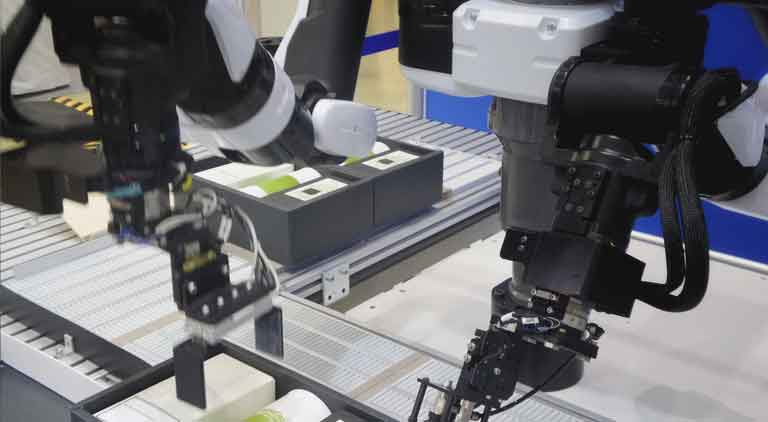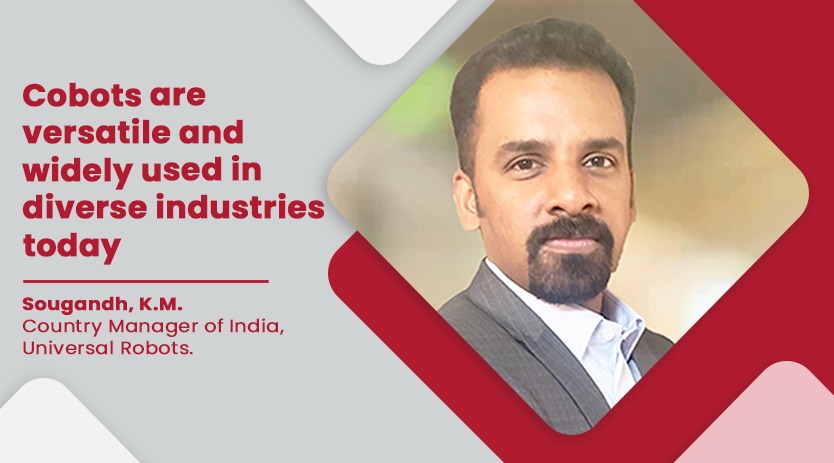Automation: Taking packaging to the next level of excellence
March 2, 2020 12:07 pm
Packaging is an important function in operations and supply chain management, and with OEMs adopting automation for higher productivity, packaging companies are also turning towards automation for increased quality and efficiency.
With automation seeping into each and every sphere of manufacturing, it comes as no surprise that the packaging sector too is adopting automation technologies. Automation technologies have immense possibilities for reducing wastage, spurring innovative technology deployment, and enhancing productivities at the shop floors of manufacturers involved in the secondary and tertiary processing.
Increasing the speed of the machines is one of the most-pursued ways to enhance efficiency. However, a maker cannot increase the speed beyond a certain point as it could lead to residual vibrations, causing spilling and wastage. Sameer Gandhi, Managing Director, Omron Automation, India, says, “Smart automation solutions reduce vibration and prevent spilling, leading to faster machines with improved performance and no wastage at the material handling shop floors. Also, with the increasing demand for more varied packaging, manufacturers grapple with bottlenecks such as precise product placement, repetitive labour-intensive tasks leading to manual errors, incorrect sorting due to a greyscale vision, and machine downtime in changeovers. With controllers, colour recognition-based vision sensors and robotics, processors can attain 100 percent precision in picking and placement with the correct orientation, impeccable sortation of products with varying shapes, colours and sizes, and reliable inspection. Better the level of precision and reliability, lesser is the amount of waste or scrap.”
Automation and IoT for packaging efficiency
Production floors over the years have become increasingly automated with automation and robotics being an integral part of machines and factories. Today, with digitalisation and IoT, machines and lines are focusing on optimisation, being scalable, flexible, efficient, productive and thus, more profitable. In addition, consumers are demanding personalised products, putting extra pressure on factories to offer such customised products at economic production runs.
Ninad Deshpande, Head – Marketing & Corporate Communication, B&R Industrial Automation tells us, “Advanced automation technologies are making such batch size one production a reality, while at the same time keeping costs down. Machines and lines are increasingly placing their trust on B&R’s ACOPOStrak and SuperTrak, which are next-generation intelligent transport solutions enabling factories to produce small batches efficiently and benefit from the higher margins of personalised products. Moreover, with IT/OT convergence, packaging machines and lines need to be connected horizontally and vertically, thus placing extra focus on open, vendor-independent connectivity such as OPC UA, MQTT and AMQP.”
Gandhi states, “Owing to its close interface with the F&B and pharma sectors, “safety and reliability” play a crucial role in the packaging industry. Automation is the key to ensure the same as well as bring significant value additions. A total traceability system is capable of backtracking every step of the manufacturing process, specifically expiry date extraction verification and specification data.” This assumes greater importance as specialised manufacturers produce varied products for multiple brands. Also, the fast-acting temperature controllers at the sealing applications ensure perfect sealing while in motion at high speed.
Precision and accuracy are the key factors to ensure perfect output in the packaging sector. Gandhi states, “This gains further importance when the product to be packaged is a medicine. With the ever-increasing shift to extremely flexible production lines, machine automation controllers equipped with artificial intelligence (AI) algorithm (real-time control based on high-speed and high-precision data gathering) are making it feasible to control production lines and equipment changing in microseconds to gauge and manage them safely before an irregularity occurs. It also allows manufacturers to contain the impact of skilled worker shortages while simultaneously increasing equipment utilisation and achieving stable production of quality products (even remotely).”
Lokesh Kaushal, Regional Segment Leader – Packaging Machinery, Asia Pacific, Rockwell Automation, says, “With the rise of developments in technology like sensors, human-machine interfaces (HMIs) and integrated motion control, flexibility of the packaging line is better than ever while increasing throughput. In today’s demanding market, integrated motion control can offer manufacturers this increase in productivity, without having to upgrade their whole factory floor. Independent cart technology is a unique technology that takes flexibility to the next level and helps us realise the dream of mass customisation without compromising on throughput.”
Industrial Internet of Things (IIoT) is helping machine builders to ensure performance of machines on the required KPI while ensuring any faults during runtime can be remotely supported by leveraging remote connectivity along with Augmented Reality. Machine builders are leveraging analytics to predict the root cause of the problem, thus reducing downtime drastically. Indian companies are making a big leap to bring shop floor information directly to make business decisions.
Roadblocks in automating packaging and digital packaging
Continuously changing consumer demands and rapidly changing technology are one of the biggest challenges while automating packaging or digital packaging machinery and lines. In addition, ensuring a short time to market with a higher RoI adds to the complexity and hurdles for any machine builder. Deshpande explains, “Building smarter, flexible, scalable machines and reducing machine development time are key areas a machine builder focuses on. With B&R, machine builders are in a position to simulate mechanics and electronics and predict machine behaviour even without having physical components, thus reducing costs and time in rework in case of errors.”
Gandhi says, “The challenges range from choosing the “right” solution (which could be resolved with the help of an able industrial automation provider) to the availability of the right partner ecosystem followed by cost of implementation and integration with other solutions on the floor. Availability of the desired skills acts as a deterrent too.”
According to Kaushal, there is no lack of automation being deployed in the packaging space, and consistent growth of automation spends in the sector is a testimony to the same. He says, “In order to maximise the operational efficiency, there is a larger journey we need to undertake. A major hurdle is that just looking at the acquisition cost v/s total cost of ownership (TCO), manufacturers often choose cheaper workarounds at the expense of much larger rejection rates and manual rework. Instead, the need of the hour is to evaluate flexibility, operational efficiency, energy efficiency, and ease of use, and support costs over the entire lifecycle should be considered. Secondly, competency to operate, maintain and utilise sophisticated systems is a nagging challenge. Although large organisations have dedicated packaging teams to think on longer terms, smaller organisations are still dependent on suppliers for up-keeping of equipment on the shop floor. A well-organised training programme complemented by latest technologies like augmented reality shall be considered to bridge the competency gap.”
More investments to be seen in automation for packaging
Kaushal says, “Upgrade packaging equipment is the new “norm” in India led by the FMCG and pharma sectors. It is driven majorly by the need for better operational excellence to compete in the highly competitive market environment. Manufacturers are looking for equipment that provide savings in labour, utilities and operational costs along with higher speeds, reliability, and minimised rejections. In order to meet the needs, packaging machinery imports currently stand at $441.5 million, growing steadily at 3.9 percent.”
The untapped unorganised sector companies are working with handpicking, deploying manual labour particularly for secondary packaging. Automation remains a distant reality for smaller production units that give preference to manual processes given the abundance of cheap labour. Nevertheless, automation is driving most investments in large-scale bottling plants and gaining momentum in end-of-line processing where production volumes and operational cost savings including labour justify the investment.
With IT/OT convergence, packaging machines and lines need to be connected horizontally and vertically.
Ninad Deshpande, Head – Marketing & Corporate Communication, B&R Industrial Automation
Smart automation solutions reduce vibration and prevent spilling, leading to faster machines with improved performance and no wastage at the material handling shop floors.
Sameer Gandhi, Managing Director, Omron Automation, India
With the rise of developments in technology like sensors, human-machine interfaces (HMIs) and integrated motion control, flexibility of the packaging line is better than ever while increasing throughput.
Lokesh Kaushal, Regional Segment Leader – Packaging Machinery, Asia Pacific, Rockwell Automation
Cookie Consent
We use cookies to personalize your experience. By continuing to visit this website you agree to our Terms & Conditions, Privacy Policy and Cookie Policy.

















 English
English Hindi
Hindi